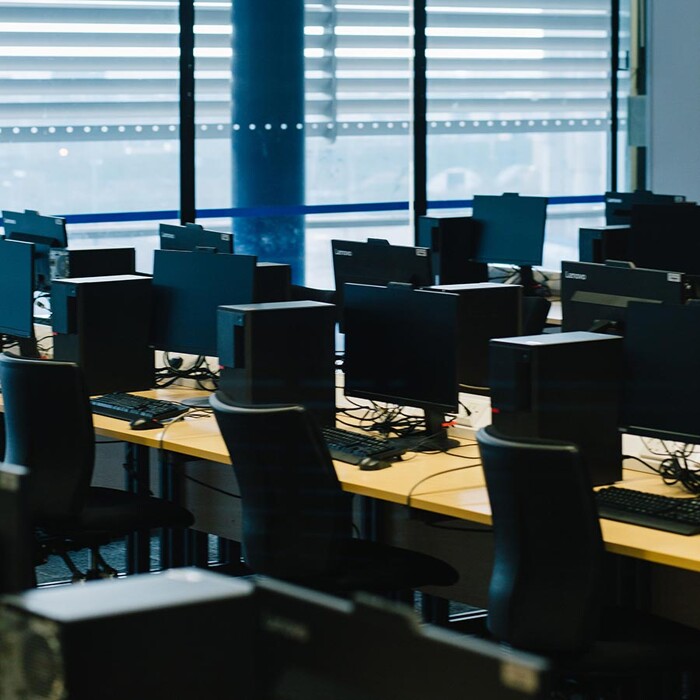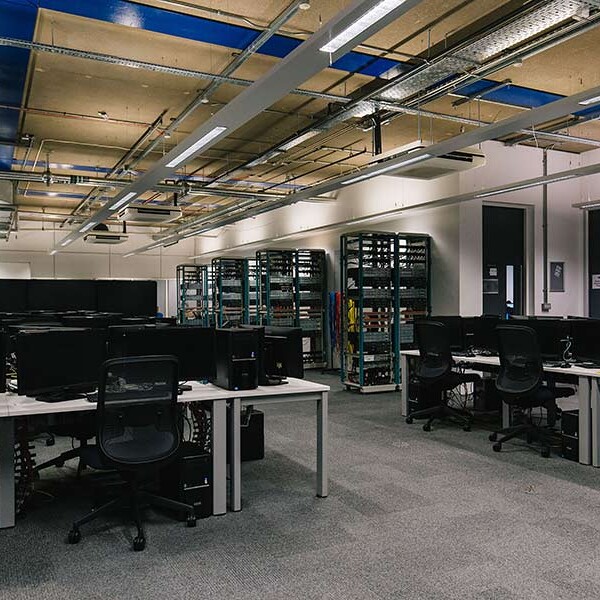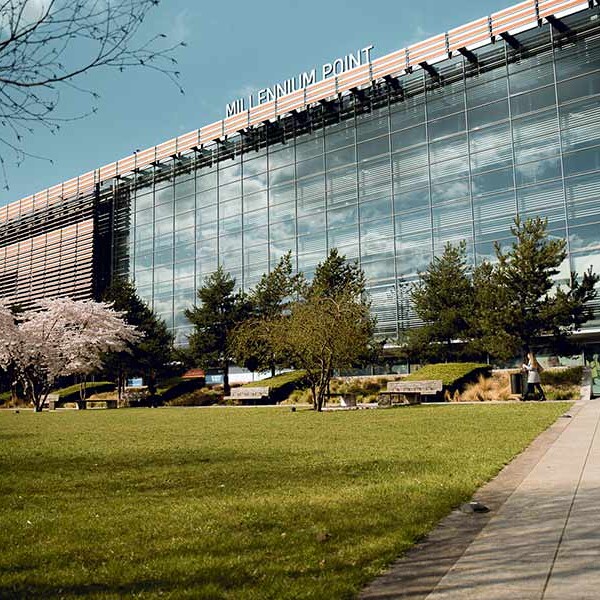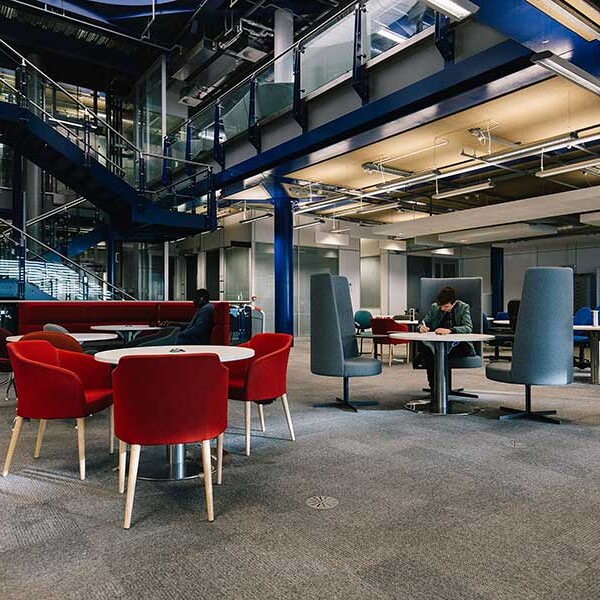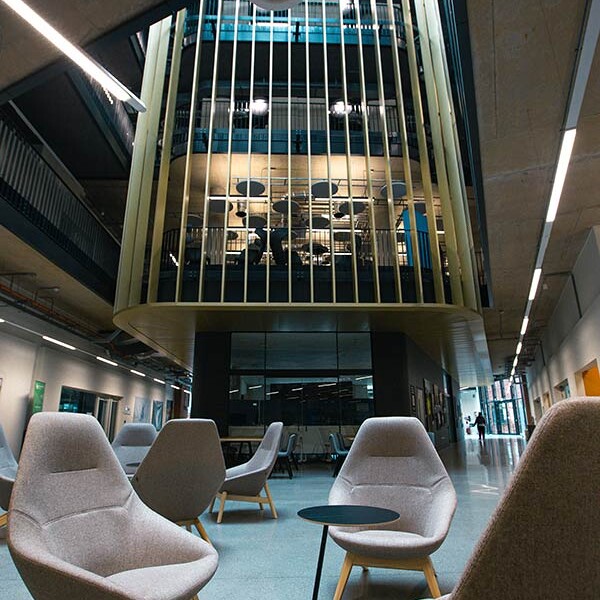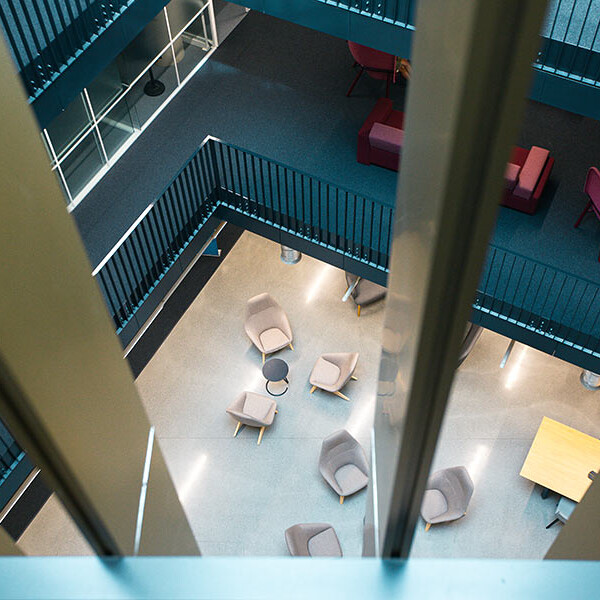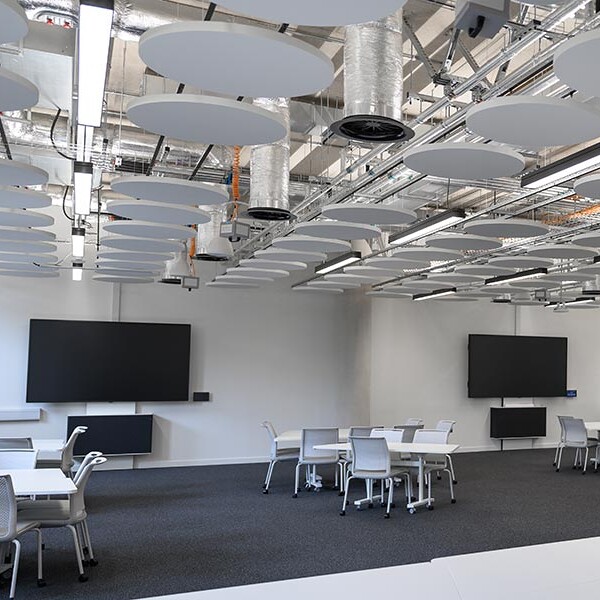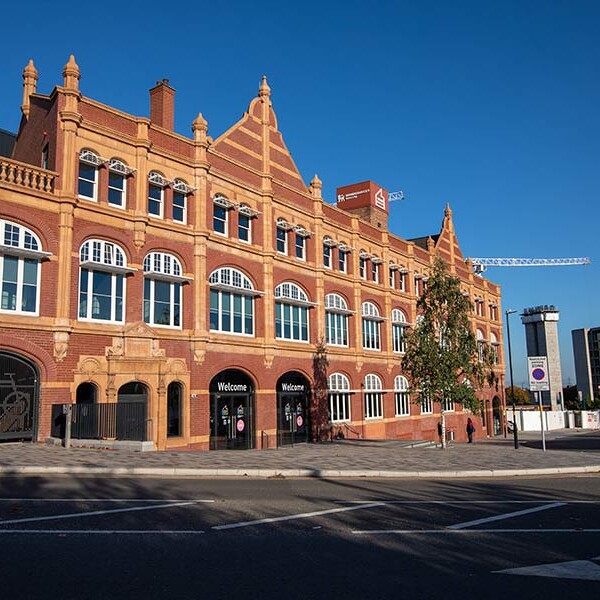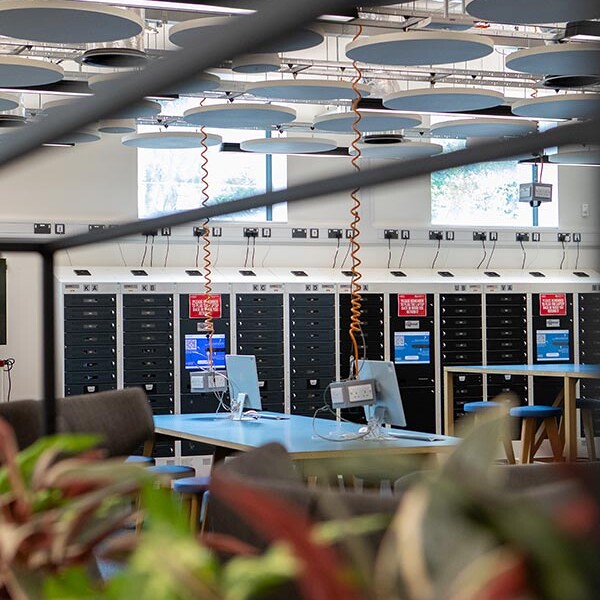
Computer Science - MSc
Currently viewing course to start in 2025/26 Entry.
The MSc in Computer Science is a conversion course that provides you a broad and balanced introduction to computer science. The course aims to prepare you for technical roles in the IT industry by introducing the key technologies and skills needed for employment.
- Level Postgraduate Taught
- Study mode Full Time/Part Time
- Award MSc
- Start date September 2025, January 2026
- Fees View course fees
- Subject
- Location City Centre
This course is:
Open to International Students
Overview
The MSc in Computer Science is a conversion course that provides you a broad and balanced introduction to computer science. The course aims to prepare you for technical roles in the IT industry by introducing the key technologies and skills needed for employment.

Introducing STEAMhouse
STEAMhouse is a centre for technology, innovation, creative thinking, prototyping and business development. Our £70 million pound building is the home for all of our Computing courses.
What's covered in this course?
The course has been designed to provide you with practical experience with models, techniques and tools from the forefront of the discipline that drive innovation in the design of software-based systems within this domain. The key topics taught on the course include Software Development (using the programming language in demand in the industry), Software Analysis & Design (techniques for designing large and complex software), Database Design & Development (backend storage for almost every IT installation in the world), Web Application Development (full stack web application development) and Artificial Intelligence (foundation of machine learning and the future of all contextual decision making). You will also learn the key skills of research, academic writing and project management required for study at masters’ level. These skills are further developed and placed in the context of the dissertation.
As a conversion course, it is assumed that you are starting fresh with little or no experience of computer science. The course offers several arrangements to ensure your smooth transition to computer science. This includes pre-semester week long programming boot camp, where you will have the opportunity to develop fundamental understanding of the programming languages that will be taught in the course. Before starting the course, you will be directed to some online short courses that will help you to develop basic understanding of various technical aspects covered in the course. You will be allocated to a personal tutor, who will be there to monitor your personal and academic welfare. In weekly meetings, your personal tutor will review your progress, discuss goals and expectations, and help you to set action plans. The philosophy of the course is to promote lifelong self-learning by providing a curriculum that promotes a variety of approaches to study. The curriculum is designed to develop not only the academic knowledge, but also the engineering ethos and practical skills required by the modern computer science professional. Academic members of staff will teach topics and supervise projects according to their personal research interests. This will give you a cutting-edge experience, one that opens up new opportunities for career advancement in industry. For students who show an aptitude for research, there is also the possibility of continuing their studies on a PhD programme.
The development of transferable skills is core to the learning strategy of the programme and is incorporated into work units and assessments: for example; team-working skills are fostered through the use of group, task-based practical projects. Keeping lab-books and submitting self assessment documentation in support of personal performance fosters self-management and personal development. You are required to meet strict deadlines, which will help you to plan your overall workload and develop time management skills.
The course structure and its content have been developed by taking into account input from various sources, including the curriculum philosophy of the Faculty of Computing, Engineering and The Built Environment, suggestions from industrial partners, feedback from current students, QAA benchmark statements, British Computer Society (BCS) requirements for accreditation, and the Computer Science curriculum guidelines released by The Joint Task Force on Computing Curricula comprising the Association for Computing Machinery (ACM) and the IEEE Computer Society.
This course is offered full-time, part-time and also full-time with the Professional Placement option to give you the opportunity to gain work experience as part of your degree.
I made the decision to enrol on the new MSc Computer Science course as it was a conversion course and thus was designed for people with no prior physical experience in technology, like myself. The course introduced us to various fields of technology such as software development, artificial intelligence, and IT project management—fields of technology I had never considered pursuing before.
Our lecturers are incredibly informed about our field, and they have incorporated any trends or updates into the curriculum to make sure we are keeping up with market demands and mastering the appropriate programming languages and software technologies.
Lindelani Moyo
Why Choose Us?
- Industry-ready - we will prepare you for the software development industry by introducing the key technologies and skills needed for employment
- Practical experience in programming languages and platforms that are in high demand in the industry
- Excellent links with industry – including SAS and Oracle. Our curriculum is embedded by industry so that you graduate able to progress into a professional career.
- Graduate jobs – after successful completion of the course you could go on to jobs such as Web App Developer, Python Developer, Database Engineer, Data Scientist (entry point), Research
- Women in Computing – we support females in computing to share experiences and become confident computing professionals through special events and society activities
- Lab-based learning - our campus has over 20 industry-standard computer labs, so you will enjoy practice-based learning throughout the course
OPEN DAY
Join us for an Open Day where you'll be able to learn about this course in detail, chat to students, explore our campus and tour accommodation. Booking isn't open for this event yet, register your interest and we'll let you know as soon as booking goes live.
Next Event: 28 June 2025
Entry Requirements
Essential requirements
Applicants must have a minimum of a 2:2 honours degree, or equivalent, in any subject area.
Applying with international qualifications
See below for further information on applying as an international student.
If you have a qualification that is not listed, please contact us.
Fees & How to Apply
UK students
Annual and modular tuition fees shown are applicable to the first year of study. The University reserves the right to increase fees for subsequent years of study in line with increases in inflation (capped at 5%) or to reflect changes in Government funding policies or changes agreed by Parliament. View fees for continuing students.
Award: MSc
Starting: Sep 2025
- Mode
- Duration
- Fees
- Full Time
- 12 months
- £10,000 in 2025/26
- Full Time
- 18 months with Professional Placement (see below*)
- £11,000 in 2025/26
- Part Time
- 20 months
- Show fees
- £1112 per 20 credits
- Year 1 - 80 credits
- Year 2 - 100 credits
Fees for Part-time students
This course can be studied on a Part-time study basis. The cost per year of study is based on credit requirements for that year.
Award: MSc
Starting: Jan 2026
- Mode
- Duration
- Fees
- Full Time
- 12 months
- £10,000 in 2025/26
- Full Time
- 18 months with Professional Placement (see below*)
- £11,000 in 2025/26
International students
Annual and modular tuition fees shown are applicable to the first year of study. The University reserves the right to increase fees for subsequent years of study in line with increases in inflation (capped at 5%) or to reflect changes in Government funding policies or changes agreed by Parliament. View fees for continuing students.
Award: MSc
Starting: Sep 2025
- Mode
- Duration
- Fees
- Full Time
- 12 months
- £18,600 in 2025/26
- Full Time
- 18 months with Professional Placement (see below*)
- £20,460 in 2025/26
Award: MSc
Starting: Jan 2026
- Mode
- Duration
- Fees
- Full Time
- 12 months
- £18,600 in 2025/26
- Full Time
- 18 months with Professional Placement (see below*)
- £20,460 in 2025/26
Application deadlines
We advise you to apply early to allow sufficient time for you to prepare to start your studies. Please apply by Friday 18 July for a September start or Friday 5 December for a January start to allow time to arrange accommodation, student finance and visas where required.
Late applications will be accepted where places are still available, but please note that Welcome Week for September entry begins on Monday 15 September 2025, and teaching begins on Monday 22 September 2025. International students are invited to arrive from Monday 8 September 2025.
To find out more, see our application timeline.
Professional Placement option*
The Professional Placement option will allow you to complete a credit bearing, 20 week Professional Placement as an integral part of your Master’s Degree. The purpose of the Professional Placement is to improve your employability skills which will, through the placement experience, allow you to evidence your professional skills, attitudes and behaviours at the point of entry to the postgraduate job market. Furthermore, by completing the Professional Placement, you will be able to develop and enhance your understanding of the professional work environment, relevant to your chosen field of study, and reflect critically on your own professional skills development within the workplace.
You will be responsible for finding and securing your own placement. The University, however, will draw on its extensive network of local, regional and national employers to support you in finding a suitable placement to complement your chosen area of study. You will also benefit from support sessions delivered by Careers+ as well as advice and guidance from your School.
Placements will only be confirmed following a competitive, employer-led selection process, therefore the University will not be able to guarantee placements for students who have registered for the ‘with Professional Placement’ course. All students who do not find a suitable placement or do not pass the competitive selection process will be automatically transferred back to the standard, non-placement version of the course.
Personal statement
You’ll need to submit a personal statement as part of your application for this course. This will need to highlight your passion for postgraduate study – and your chosen course – as well as your personal skills and experience, academic success, and any other factors that will support your application for further study.
If you are applying for a stand alone module, please include the title of the module you want to study in your Personal Statement.
Not sure what to include? We’re here to help – take a look at our top tips for writing personal statements and download our free postgraduate personal statement guide for further advice and examples from real students.
Course in Depth
Module
In order to complete this course a student must successfully complete all the following CORE modules (totalling 180 credits):
Within the module of Computer Programming you will learn the key skills of Programming and how this relates to technology and communications. Programming is an engineering tool that plays a vital role to drive most of the modern technologies surrounding us, including the technological devices for communication, transportation and entertainment. In other words, it can be said that our modern lifestyles are heavily dependent on programming. Moreover, businesses increasingly rely on computers and the software run on them. Programming skills and a broader and deeper understanding of programming are therefore becoming increasingly important to the jobs market.
This module is about software engineering with a focus on software design. It covers three stages of the software engineering life-cycle, requirements, design and implementation, but with a focal point on design and an emphasis on the design theme. The module provides the necessary skills to construct models of requirements and designs. The standard UML is used as the modelling language, the vehicle through which important design concepts are explored to convey a software engineering ethos based on getting it right by adequately studying the problem and mindfully constructing designs of software solutions.
This module provides a comprehensive introduction to a vitally important core IT topic (database technology) that is found in almost every IT installation in the world and as such provides extremely good transferable skills. The module not only introduces you to traditional database skills and knowledge (data models, normalization, SQL etc.) but also looks forward into the future IT world via OO, XML and web-database technologies. Once mastered, these database skills will provide a firm foundation for higher-level academic study or a rewarding IT career.
This module aims to provide you an in-depth knowledge of the skills and techniques required to develop web applications. The module will equip you with skills for client-side programming, serverside programming, and backend services e.g. databases to build modern web applications. You will also learn how to deploy and maintain web applications.
The amount of data produced by humans and machines today far outstrips the ability of humans to consume, analyse, and make complex decisions based on that data. Artificial intelligence forms the foundation of all machine learning and reflects the future of all contextual decision making. From healthcare to finance, AI now impacts nearly every industry by dramatically improving workplaces' efficiencies and expanding the capabilities of the work humans can do. When AI takes over repetitive or dangerous tasks, minimises occurrences of 'human error', or support decision-making, it frees up the human workforce to do work they are better equipped for, involving creativity and empathy.
This module prepares you for the research project that you will undertake towards the end of your master’s course. It equips you with knowledge and transferable skills that will also help you in your subsequent career, for example, when you are asked to write a report or to carry out an IT project. You will become familiar with the research literature in your discipline, research methodology and research ethics, as well as project management tools, methods and techniques.
The purpose of the module is to enable you to undertake a sustained, in-depth and research-informed Level 7 project exploring an area that is of personal interest to you. In agreement with your supervisor, you will decide upon your topic which will take the form of a practical outcome (artefact) with accompanying contextual material. The main consideration when choosing your topic is that it must be aligned to the programme you are studying and informed by the research strategy of your school, and you should consider the relevance of this topic to your future academic or professional development.
Professional Placement Year (optional)
In order to qualify for the award of MSc Computer Science with Professional Placement, you must successfully complete all of the Level 7 modules listed above as well as the following Level 6 module.
This module is designed to provide you with the opportunity to undertake a credit bearing, 20-week Professional Placement as an integral part of your Master’s Degree.
The purpose of the Professional Placement is to improve your employability skills which will, through the placement experience, allow you to evidence your professional skills, attitudes and behaviours at the point of entry to the postgraduate job market. Furthermore, by completing the Professional Placement, you will be able to develop and enhance your understanding of the professional work environment, relevant to your chosen field of study, and reflect critically on your own professional skills development within the workplace.
Download course specification
Download nowKnowledge and understanding are acquired though a mixture of formal lectures, tutor-led seminars and practical activities, with other independent learning activities at all stages.
Emphasis is placed on guided, self-directed and student-centred learning with increasing independence of approach, thought and process.
The course provides access to effective commercial development environments and ensures students have practical awareness of computer systems requirements. You are required to meet strict deadlines, and to manage and plan overall workload.
Knowledge is assessed formatively and summatively, by a number of methods, including seminars, course-work, viva, presentation, and project work.
Assessment criteria are published both at a generic course level and to provide guidance for individual items of assessment.
You will undertake a major project involving research and application of that research in the solution of appropriate systems problems.
Professional Placement option*
The Professional Placement option will allow you to complete a credit bearing, 20 week Professional Placement as an integral part of your Master’s Degree. The purpose of the Professional Placement is to improve your employability skills which will, through the placement experience, allow you to evidence your professional skills, attitudes and behaviours at the point of entry to the postgraduate job market. Furthermore, by completing the Professional Placement, you will be able to develop and enhance your understanding of the professional work environment, relevant to your chosen field of study, and reflect critically on your own professional skills development within the workplace.
You will be responsible for finding and securing your own placement. The University, however, will draw on its extensive network of local, regional and national employers to support you in finding a suitable placement to complement your chosen area of study. You will also benefit from support sessions delivered by Careers+ as well as advice and guidance from your School.
Placements will only be confirmed following a competitive, employer-led selection process, therefore the University will not be able to guarantee placements for students who have registered for the ‘with Professional Placement’ course. All students who do not find a suitable placement or do not pass the competitive selection process will be automatically transferred back to the standard, non-placement version of the course.
This course is accredited by the following organisations:
Our accreditations from these bodies show employers that you have the level of knowledge and skills they need when you graduate.
Employability
Enhancing your employability skills
We know that employers are looking for graduates who have a good balance between in-depth academic knowledge and technical and practical expertise, which is why our course is geared towards employability.
What you learn on our course will help you to stand out when you look for your first professional role. Because you will know how to use sophisticated, industry-standard software, you will be able to demonstrate that you can put into practice your deep theoretical knowledge.
We will also prepare you for a career by equipping you with a range of transferable skills, such as complex problem-solving expertise, the ability to analyse in a careful and considered manner, and working as a team member. We aim to have you employer-ready by the time you graduate and, as part of your Advanced Computer Science course, we will invite guest speakers to underpin the subjects taught.
Thanks to our excellent partnerships and working relationships with some of the UK’s leading companies, you have the chance to network with leading organisations such as IBM, Dignity plc, Mortgage Brain and Griffiths Waite. In addition, our specialist industry links with the Linux Professional Institute, the Oracle Academy, Cisco, and Microsoft, plus our world-class facilities, will mark you out as a highly employable graduate.
This is why our graduates have gone on to pursue computing and software development and designer careers in a wide range of industries, from SME software companies, to industry, government, banking and healthcare. Furthermore, many graduates continue their studies to Doctorate level.
Facilities & Staff
Our Facilities
We are constantly investing in our estate and are currently in the process of spending £260 million on new learning facilities. This course will be taught at Millennium Point at the City Centre Campus.
The course is supported with a wide range of cutting-edge facilities in the City Centre Campus. We have a state-of-the-art computer games technology lab which contains high-performance PCs, Sony PlayStation development kits and a range of industry standard software including Unity, Unreal and a suite of professional Microsoft development tools.
We also have many open access areas where students can study together and even hire out laptops for use in these spaces and others within the university.
Within the University there are many internationally recognised research teams giving you the opportunity to collaborate with them on exciting interdisciplinary projects.
Computer networking
The laboratories are well-equipped for all our computer networking courses, as well as specialist areas for practical work such as voice-over internet protocol (VoIP), forensic and ethical hacking technologies, wireless and mobile technologies and radio frequency identification technologies to name but a few.
Software development and computer programming
There are a number of open access, software development and computer programming laboratories that can be used to develop systems and programmes, including database management systems such as MySQL, to name but a few.
Systems laboratories
Our embedded systems laboratories are used to develop real-time systems, such as specialist hardware training and development resources, and industrial-standard software development and simulation tools. These include microcontroller software and robotics design and development, to name but a few.
Electronic systems
To underpin the basic principles of electronic systems, we have a well-equipped laboratory of general and specialist test and measurement kits, including powered prototyping development boards, dual power supplies, frequency generators and counters and digital multi-meters to name but a few.
Forensic computing
Our successful development of forensic computing has led to a specialist forensics laboratory that is fully equipped with essential hardware and software for this sensitive area of study. The laboratory includes high-spec PCs with built-in multi interface Tableau write blockers, EnCase and FTK computer forensic software and steganography detection and analysis software, to name but a few.
Our staff
Dr Khaled Mahbub
Associate Professor in Software Engineering
Khaled started his academic career, in September 1999, as a Lecturer (US hierarchy) in Computer Science & Engineering at the Department of Computer Science and Engineering, Ahsanullah University of Science and Technology, Dhaka, Bangladesh, where he worked until March 2001.
More about KhaledDr Antonio Nehme
Lecturer in Computer Science
Antonio Nehme holds a BSc in Computer Science with a minor in Mathematics from the Lebanese American University and a PhD in Cyber Security from Birmingham City University. His research focuses on identity management and access control, security of microservices-based applications, auditing and secure collaborations in distributed systems,...
More about AntonioDr Faisal Saeed
Associate Professor
Faisal Saeed is an Associate Professor at the College of Computing and Digital Technology, at Birmingham City University. He leads the MSc Artificial Intelligence course and Research Summer School at the College. Previously, he worked as an Assistant and Associate Professor at the Information Systems Department, Taibah University, KSA (2017-2021),...
More about FaisalDr Debashish Das
Data Science Lecturer
Having 20 years of teaching and research experience at leading universities in UK, Malta, Malaysia and Bangladesh, Debashish joined Birmingham City University as a Data Science Lecturer at the Faculty of Computing, Engineering and The Built Environment.
More about DebashishRasheed Mohammad
Lecturer in Computer Science
Dr. Rasheed has 20-year teaching experience. He has taught several courses in computer science including website development, operating system, database I&II, Data structure, Java programming, c/c++ programming, intelligent systems, computer organization, computer system security etc.
More about RasheedDr Essa Shahra
Lecturer in Computer Science
Dr. Essa Shahra (BSc, MSc, PhD) is a Lecturer in Computer Science. Dr. Essa Shahra is an experienced lecturer with over 12 years of expertise in academia and industry. He specializes in delivering postgraduate modules, mentoring undergraduate and master's students, and has held roles as an Assistant Lecturer and Research Assistant across the UK...
More about Essa

